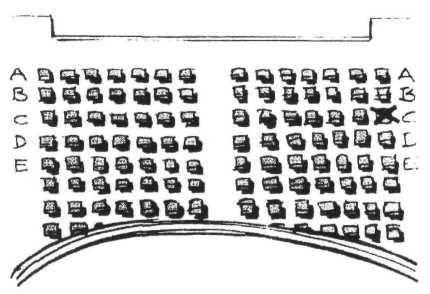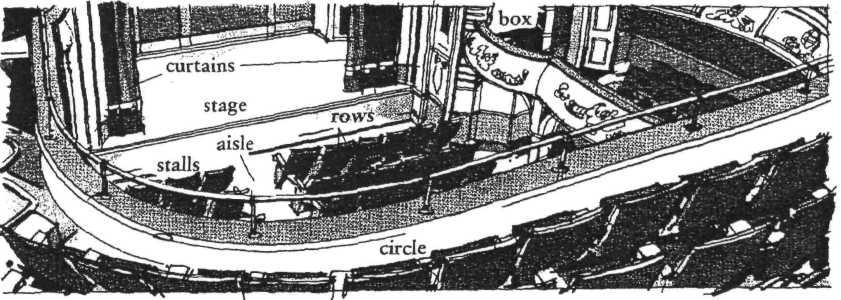
- •Arts and culture
- •Vocabulary 1 arts
- •1. Study the information in the box and do the following exercise.
- •2. Each one of these sentences contains a mistake of usage of words connected with the arts. Find the mistake and correct it. You may need a dictionary.
- •3. Complete the chart by adding words from the list given below it. Some may go in more. There is an additional column for you in case you have another group of words.
- •4. Put the words in the list below in the best place on the brain map. Some words may be in more than one place! Then add some of your own words.
- •5. Now complete the following sentences with appropriate vocabulary from the brain map.
- •Vocabulary 2 Music, art and literature
- •2. What do you call the people who play the following instruments?
- •3. What types of painting are these?
- •4. Fill in the gaps with the correct word.
- •5. Use the context and your own knowledge to fill the gaps in these sentences and dialogues.
- •6. Complete this story of Craig David’s early years.
- •7. Answer these questions. If possible, ask someone else the same questions.
- •8. Underline the most suitable word or phrase.
- •9. Complete each sentence with a word from the box. Use each word once only.
- •10. Complete each sentence by putting in, on, at or out of in each space.
- •11. Complete each sentence with a word from the box. Use each word once only.
- •12. Choose the most suitable word or phrase to complete each sentence.
- •13. Use the word given in capitals at the end of each line to form a word that fits in the space in the same line. The school play
- •14. Complete the compound word in each sentence with a word from the box. Use each word once only.
- •15. Adjectives and phrases to describe music
- •16. Idioms
- •Vocabulary 3 Adjectives ending in –ed and -ing
- •1. A Choose the correct word.
- •2. Complete the sentences using one of the words in the box.
- •3. Complete the adjectives in column a with –ed or –ing. Then complete the sentences with a phrase from column b.
- •Interested in...:
- •2. Put in the correct preposition.
- •Vocabulary 5 books
- •1. Put each of the following words in its correct place in the passage below.
- •2. Decide which answer (a, b, c or d) best fits each space. Why read books?
- •3. Fill in the gaps in the model answer below. Use one word in each gap.
- •5. Choosing the right form
- •Need. Absence of Necessity.
- •7. Choose the alternative that best suits the context.
- •8. Fill in: must or have to.
- •9. Complete the following sentences with must not or doesn't / don't have to.
- •10. Underline the correct words. Sometimes both options are possible.
- •13. Permission and prohibition
- •14. Obligation and permission
- •The 1901 Teaching Contract for Female Teachers
- •15. Obligation, prohibition, permission (past)
- •1. Give advice to the people in the following situations. Use should or ought to.
- •2. For each of these situations, give two suggestions with could. Then give definite advice with should.
- •3. Put in should, shouldn't, must or mustn't.
- •5. Look at the pictures. Beside each one, write something you would say to the person, and something about the person. Use either should/shouldn’t or ought/ought not to.
- •6. Think of three things that people say to you, criticizing you.
- •7. Now you can criticize somebody you know!
- •8. Learning from learners
- •9. Fill in the gaps with the correct form of (not) have to, ought to or must(n't) and the verbs in brackets.
- •10. Completing conversations
- •Vocabulary 1 going out
- •1. Put the sentences of this dialogue in the right order.
- •2. Try to fill in the blanks with suitable words.
- •3. Complete the sentences with the right form of the following words. Sometimes there is more than one possible answer.
- •Vocabulary 2 Other/Another
- •1. Fill in the blanks with the appropriate form of other.
- •2. Fill in the gaps using another, (the) other, (the) others.
- •Vocabulary 3 Likes and Dislikes
- •2. Write sentences about yourself. Say whether you like or don’t like these activities. Choose one of these verbs for each sentence:
- •3. Put in a suitable verb in the correct form, - ing or to ... Sometimes either form is possible.
- •4. Adverb and adjective collocations.
- •Vocabulary Writing a review
- •1. Complete the sentences with a preposition.
- •2. Think of a film or tv programme that you liked. Replace the words in italics with information about that film or programme.
- •3. Which tense is used in reviews to give details of the plot?
- •3. Change the sentences into polite requests using the words in parentheses.
- •4. First, complete the items in this activity with appropriate modal auxiliaries. After each, indicate whether your sentence is formal or informal.
- •5. Read the situation and write questions beginning Do you think…
- •6. What would you say in these situations?
- •7. Write what you would say in the following situations.
- •8. Responses
- •Vocabulary Cinema and theatre
- •1. Look at the picture of your visit to the theatre and answer these questions.
- •2. What word or phrase is being defined?
- •Vocabulary do and make
- •1. Use either do or make to fill in the blanks.
- •2. Finish each of the following sentences in such a way it means exactly the same as the sentence printed before it.
- •3. Fill in the gaps using make or do.
- •1. Complete the sentences with can, can't, could, or couldn't.
- •2. Complete these sentences about the Wilson’s plans with can/can’t and ‘ll be able/won’t be able to.
- •5. Fill in: was/were able to, could(n't), had been able to, will be able to or can.
- •6. Underline the most suitable words. Sometimes both options are possible.
- •Grammar Revision
- •1. Which of the words in the box will fit the sentences? Often there is more than one possibility.
- •2. Underline the correct answer.
- •3. Fill in the gaps below with the correct form of (not) have to, must, (not) need or should.
- •4. Read the extract. Decide if the underlined phrases are correct or not. Tick (V) them if they are right and correct them if they are wrong.
- •5. Necessary or not necessary?
- •7. Paraphrase the following sentences, using modal verbs so that they are as similar in meaning as possible to the first ones.
- •8. Write what each person would say in each situation using modals. Sometimes more than one answer is possible.
Vocabulary Cinema and theatre
|
A Theatre At the theatre you can see plays, e.g. Hamlet by Shakespeare, or musicals, e.g. Phantom of the Opera by Andrew Lloyd Webber. In a play the cast (= the total number of actors) is usually quite small, but musicals often have a very large cast. One difference between the theatre and cinema is that you usually book (= reserve) tickets in advance (= some time before the actual performance) if you are going to the theatre. Another difference is that the audience (= the people watching the play/musical) clap at the end of the performance. This does not usually happen (in Britain) at the end of a film.
B Cinema Plays are performed on stage, films are shown on screen. In your country, films in English are either shown with subtitles (= there is a translation across the bottom of the screen), or they are dubbed (= the English is removed and replaced by actors speaking in your own language). Films are set (= take place) in many different periods and places, e.g. Room with a View is set in the early part of the 20th century; Blade Runner is set in the future. And when people talk about films, they often talk about the director, e.g. Spielberg, Bertolucci; and the stars, the most important actors and actresses, e.g. Tom Hanks and Jodie Foster.
C Types of film western: a film about America in the 19th century; often with cowboys and Indians war film, e.g. Born on the 4th of July action film, e.g. Indiana Jones horror film, e.g. Dracula; Frankenstein comedy: a funny film that makes you laugh science fiction film: about the future romantic comedy: love story and funny romance: a love story/about a relationship disaster movie: e.g. Titanic thriller: an exciting story often about a crime
D Describing plays and films Journalists write articles in which they give their opinion of new films and plays. They are called critics, and their articles are called reviews. These are some words they may use:
moving: producing strong emotions, often of sadness; a positive word violent: includes lots of scenes with fighting and death powerful: has a big effect on our emotions gripping: exciting and very interesting good fun: used to describe a film that may not be very serious or important but is enjoyable slow: boring brilliant/superb acting (= fantastic acting) an awful/dreadful film (= terrible) a complex plot (= story with many ideas) |

1. Look at the picture of your visit to the theatre and answer these questions.
1 Did you sit in the stalls or circle?
2 Which row were you in?
3 Were you next to an aisle?
4 Did you have a good view of the stage?

